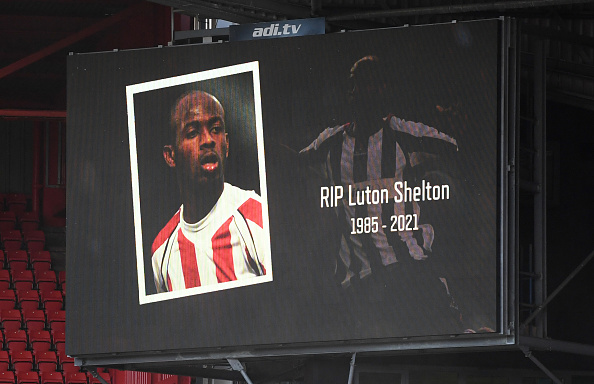Jamaican Soccer Star Luton Shelton Dies of ALS. We Must Be Proactive.

By Joy Stephenson-Laws, JD, Founder
It is true. We really don’t know what cards we will be dealt in life. Take Luton Shelton, a professional soccer player from my home country Jamaica. Shelton recently died of amyotrophic lateral sclerosis (ALS), also known as Lou Gehrig’s disease. He was just 35-years-old. He is survived by his wife and three children.
As a soccer player who could do things physically that not everyone can, I bet Shelton did not expect to get such a debilitating disease such as ALS. He was diagnosed in 2017.
I have previously discussed ALS/Lou Gehrig’s disease in multiple pH Labs blogs.
Lou Gehrig was a Major League Baseball player born in 1903. He died in 1941 after a rough battle with ALS, and his name continues to bring awareness to this devastating neurodegenerative disease.
ALS is progressive and essentially causes a person to lose control of his or her brain. This disease affects nerve cells in the brain and spinal cord that play a role in controlling voluntary muscle movement (like walking, talking, chewing and even breathing).

“Early symptoms of ALS usually include muscle weakness or stiffness. Gradually all muscles under voluntary control are affected, and individuals lose their strength and the ability to speak, eat, move, and even breathe,” reports the National Institute of Neurological Disorders and Stroke.
“Most people with ALS die from respiratory failure, usually within 3 to 5 years from when the symptoms first appear. However, about 10 percent of people with ALS survive for 10 or more years.”
Recently, Broadway star Rebecca Luker died due to ALS complications at the age of 59 (just a little over a year after receiving her diagnosis).
As you may already know, physicist Stephen Hawking really defied the odds and lived with ALS for nearly five decades. He was just 21-years-old at the time of his diagnosis and died at the age of 76.
Unfortunately, there is no cure for ALS and we don’t really know what causes it. It is true, however, that scientific studies have suggested that genetics and environmental factors such as physical trauma, exposure to toxic agents and diet may play a role.
The good news is that ALS is pretty rare in Americans. It is more common in Caucasian men, and symptoms commonly begin to show between ages 55 to 75. Of course, as we can see with the death of Luton Shelton (a 35-year-old Jamaican man), ALS can happen to anyone.
It is extremely important to acknowledge that there may be a connection between ALS and head injuries. Former New Orleans Saints player Steve Gleason has been battling ALS for 10 years. This pH Labs blog discusses how there have been several young football players affected by ALS. And we all know that some of the biggest dangers for football players are concussions and other head injuries.
I am in no way saying that Luton Shelton’s case of ALS was caused by a head injury he suffered back in 2014, but it is very important for athletes to protect themselves from head injuries as much as possible. I think as a society we tend to forget that our athletes are not superheroes and that the risks they take in playing a sport can be very high.
“Given the frequency of head impacts in contact sports, the public health implications of these consequences may be significant,” according to the National Institutes of Health (NIH).
“In soccer, athletes experience repetitive head impacts from using their heads to strike the ball for passing and shooting. Older research involving amateur and professional soccer players indicated an association between cumulative heading and neuropsychological impairments. One study of 37 former professional soccer players found mild to severe deficits in the areas of attention, concentration, memory, and judgment in 81 percent of the players. The authors speculated that this finding could be indicative of permanent organic brain damage resulting from repeated traumas from heading the ball.”
Again, this is not to say that this is a definitive cause of ALS, but it could be a major risk factor.
Be Proactive About ALS.
One of the best preventative strategies may be following a healthy, nutrient-rich diet that fights oxidative stress and inflammation. Eat plenty of fruits and veggies and avoid processed and ultra-processed foods as much as possible. It is also definitely worth noting that vitamin B12 may slow down the progression of ALS if you already have it.
Also don’t forget to take routine nutrient tests in order to identify any nutritional imbalances or deficiencies you may have. If the test reveals you do, a competent healthcare professional can work with you on making the necessary dietary changes and recommend quality supplements if necessary.
For more information on ALS and additional actions you can take to be proactive, check out these pH Labs blogs.
Enjoy your healthy life!
Disclaimer: This article is not intended to provide medical advice. Please consult with your doctor or another competent healthcare practitioner to get specific medical advice for your situation.
The pH professional health care team includes recognized experts from a variety of health care and related disciplines, including physicians, attorneys, nutritionists, nurses and certified fitness instructors. This team also includes the members of the pH Medical Advisory Board, which constantly monitors all pH programs, products and services. To learn more about the pH Medical Advisory Board, click here.







